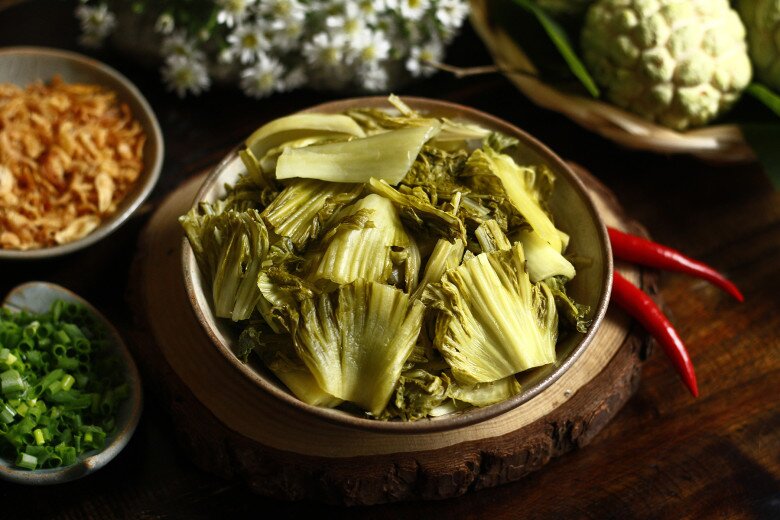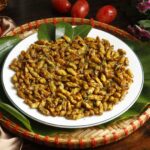Salted Pickled Mustard Greens
According to Associate Professor Dr. Nguyen Duy Thinh, from the Institute of Biotechnology and Food Technology at Hanoi University of Technology, pickled mustard greens have existed for thousands of years. This is a popular vegetable side dish that is fermented by microorganisms, creating a salty and sour flavor. During fermentation, harmful microorganisms are inhibited, allowing for longer preservation.
As shared by Associate Professor Thinh, the fermentation process transforms the nutritional components, enhancing the flavor and making it more appetizing. This process also reduces difficult-to-digest or harmful nutrients. Additionally, the fermented greens contain beneficial microorganisms that support digestive health. When consumed and prepared correctly, it does not pose any health risks.

The essence of salted pickled mustard greens is beneficial, but improper consumption or pickling methods can be detrimental to health. “During the pickling process, nitrates, which are residues in vegetables due to urea fertilizer or absorption from nitrate-rich soil, undergo a transformation into nitrites. In the first 2-3 days of pickling, nitrite levels increase, then gradually decrease and disappear once the greens turn sour. When nitrites enter the body, they react with amino acids to form nitrosamines, which pose a cancer risk,” Associate Professor Thinh explained.
To enjoy salted pickled mustard greens healthily, avoid consuming freshly pickled greens. Additionally, as they are typically high in salt content, they are not suitable for individuals with hypertension or kidney disease. For those in good health, it is recommended to limit salt intake to around 5mg per day, which equates to about 50-100g of pickled vegetables. When pickling, use ceramic or porcelain containers instead of plastic boxes or buckets.
Cooked Vegetables Left Overnight
To save money, many families often consume leftover vegetables from the previous night, including stir-fried, boiled, or stewed dishes. However, according to Doctor of Medicine Nguyen Xuan Tuan, a lecturer at the University of Medicine and Pharmacy – Vietnam National University, Hanoi, after a night, these vegetables are prone to bacterial attack, fermentation, and the development of strange odors or mold. Regular consumption of such vegetables increases the risk of digestive issues and food poisoning.

According to nutritionists, green leafy vegetables, in particular, tend to have high nitrate content. Once cooked, if left for an extended period, bacteria break down nitrates to form nitrites, which are carcinogenic. When nitrites are ingested, they can form N-nitroso compounds in the stomach, potentially causing cancers of the esophagus, stomach, and digestive system. Reheating the vegetables can further increase the nitrite levels.
Additionally, doctors advise that leaving food overnight results in a significant loss of nutrients. Improper food storage can also lead to spoilage, mold, and food poisoning, impacting one’s health. It is recommended to cook just enough food for a single meal. If cooking in advance, avoid adding seasonings like fish sauce, salt, or MSG to the stew. After cooking, set aside a portion to be consumed within the day, and store the rest in a glass container in the refrigerator once it has cooled down.
Furthermore, never store leftover stew in aluminum or stainless steel pots for extended periods, as chemical reactions can occur, leading to the formation of harmful precipitates.



































